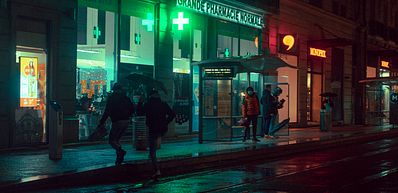
-
![plug]() Provided by: Denny Müller/unsplash
Provided by: Denny Müller/unsplash

Our travel guides are free to read and explore online. If you want to get your own copy, the full travel guide for this destination is available to you offline* to bring along anywhere or print for your trip.
*this will be downloaded as a PDF.Price
€4,95
Electricity
The guide was updated:Tunisia operates on a 230V supply voltage and 50Hz. Power sockets in the country are of type C and E. The Type C plug, commonly known as the Europlug, features two round pins, while the Type E plug also has two round pins but includes a socket for the earthing pin.
Useful Information
Digital Travel Guide Download
Our travel guides are free to read and explore online. If you want to get your own copy, the full travel guide for this destination is available to you offline* to bring along anywhere or print for your trip.
*this will be downloaded as a PDF.Price
€4,95

Monastir Habib Bourguiba International Airport (MIR) is located less than 10 km from the city centre.
Taxi services can be incredibly convenient when travelling to or from the airport. Whilst at the airport you'll find both yellow taxis and white taxis available for hire. The white taxis are designated for tourists and tend to offer a higher level of comfort. For that reason they are more expensive than the yellow ones.
The rail network of Monastir connects the airport to the city and to other major cities as well. To check the schedule of trains in Monastir and buy your ticket online, visit www.sncft.com.tn.
Read more

Passport/Visa
For stays of up to 90 days, a visa is not required for citizens of 97 world countries, including all citizens of the European Union (except Cyprus), Untied States, Canada, Australia and Russia. Citizens of Azerbaijan, Belarus, Georgia, Kazakhstan, Kyrgyzstan, Macao, Tajikistan, Turkmenistan, Ukraine and Uzbekistan may only enter visa-free when travelling as part of an organised tour, upon producing a hotel voucher. For updated information at your planned time of travel, please contact an embassy or consulate closest to you.
Read more

Public Transport
There are regular northbound trains from Monastir to Tunis via Sousse and southbound trains to Mahdia via Lamta. The main railway station of Monastir is called Gare Habib Bourguiba Monastir, which is located in the city centre very close to the Ribat.
If you want to go to the capital, you can take a train from Monastir to Tunis which will leave you at the Gare de Barcelone station. If you want more information about it, check out the website of Société Nationale des Chemins de Fer Tunisiens.
There is also a regular bus service to Sousse departing twice daily from Monastir bus station near the Medina, arriving in around 35 minutes at Cite Erriadh station.
Read more

Best Time to Visit
The weather in Monastir is always pleasant, but the best months to come here are June and September when the temperatures aren't too high, averaging around 29°C.
The most important festival in the city is the International Festival of Monastir which takes place in the summer at the Ribat of Monastir. With a lot of famous international artists making appearances and all sorts of entertainment being showcased such as music, theatre and ballet, the annual gathering is sure to be a memorable spectacle.
Read more

Frequently Asked Questions
- Is Monastir safe?
Monastir is considered to be quite safe. As Monastir is such a popular tourist destination, there are frequent police patrols during the day and through the night. Most of the city is well lit, although it is advisable to avoid some areas after dark and always be aware of pickpockets in busy markets.
- Is Monastir expensive?
Monastir is not an expensive tourist destination. On average, the cost of living is around five times less than that of the UK.
- Is Monastir worth visiting?
The long golden beaches, clear sea and historical significance of Monastir come together to make it a popular tourist destination.
- What is the history of Monastir?
Monastir has a rich history which comes through in its expertly preserved ancient architecture dating back to the Phoenician times. The city was founded on the ruins of Ruspina after the fall of the Roman Empire. It is also the birthplace of the first Tunisian president Habib Bourguiba who transformed Tunisia during the 1950s.
Read more

Taxi
Yellow taxis are probably the best way to explore Monastir although most of the main points of interest can be done by foot. You can flag them down almost anywhere and it is a fast and efficient way to get around town. If you need a taxi to get back to the airport, it is best to ask at your hotel's reception desk to avoid any tourist traps.
The 'taxis collectifs' with a blue stripe painted on the side are the best way to get around the region and visit neighbouring cities such as Sousse. There is no specific schedule for these cabs, just head to the Gare Routière and hop on. They leave only once they’re full.
Read more

Post
There are several post offices in the city centre, the main one being the La Poste Monastir which is the local branch of La Poste Tunisienne. It is usually quite busy here so try and get there as early as possible. Also, make sure to get a tracking number if you are sending items abroad as they have been known to get lost in transit.
Read more

Pharmacy
There are several pharmacies located in the city centre, but for most tourists who are staying in one of the resorts or hotels along the beach near the touristic zone, Pharmacie Souani is probably the easiest to get to.
The Tunisian healthcare system is one of the best in Africa and most pharmacies have an extensive list of medications in stock. That being said, for complicated medical conditions it may be necessary to go to Sfax or Tunis.
Read more

Telephone
Country Code: +216
Area Code: 73
Read more

Electricity
Tunisia operates on a 230V supply voltage and 50Hz. Power sockets in the country are of type C and E. The Type C plug, commonly known as the Europlug, features two round pins, while the Type E plug also has two round pins but includes a socket for the earthing pin.
Read more


